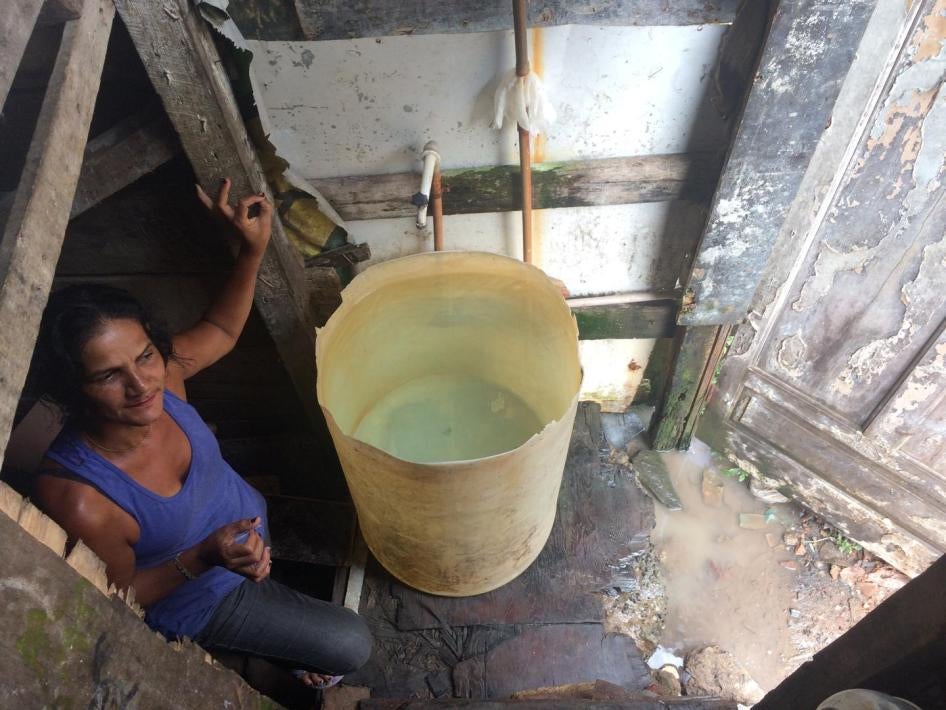For 10 months, my Human Rights Watch colleagues and I have been researching the impact of the Zika epidemic on women and girls in northeastern Brazil. We interviewed 183 people, including 98 women and girls. Before heading out each day, our team would conscientiously spray ourselves down with DEET and inspect any exposed skin. But three weeks ago, I was in a place I thought was safe. I was visiting Alabama, where Catherine Flowers, an environmental justice activist, told me that I wasn't dressed properly for a visit. "Those mosquitoes will eat you alive," she said as she scratched at a spot on the back of her arm before I hopped in the car.
Indeed, I was woefully unprepared. It's mosquito season, so I should have known better. But with all of my experience, why didn't I think about bringing my DEET? Because, I was in
Lowndes County, Alabama. Not Recife, Brazil, which was the epicenter of the
Zika outbreak 18 months ago and the focus of most news coverage. But rural and impoverished communities in the United States, such as Lowndes County, where there have been underinvestments in water and sanitation, face risks of mosquito-borne and other neglected tropical diseases.
Flowers was taking me to see the impact of failing septic systems and to visit households with pipes that pumped raw sewage onto the ground behind them. A big storm had passed through earlier in the week bringing lots of rain, which makes the situation worse.
The problems of rural Alabama are not as dire as those of the poorest favelas (Brazilian slums) in Recife -- the quality of water is higher, the population density lower, the epidemiological surveillance better and the overall public health system stronger. Yet the similarities are striking. These are forgotten places.
In Lowndes County, I visited homes where toilets flush down pipes that flow into open woods or fields. In Recife, they flushed to open water behind homes. In both, rural women have to travel long distances while in labor to reach a safe place to give birth. The outbreak in Brazil exposed longstanding human rights problems that in turn exacerbated its impact.
The Zika virus is most often transmitted through the bite of an infected Aedes mosquito. The warm, humid climate of northeast Brazil, with climate change in the backdrop, is a place where the mosquito thrives. By late 2015 and early 2016, the little-known virus
originating from Africa shot to international attention as authorities linked babies born with disabilities to an outbreak of Zika.
In their hurried efforts to respond, Brazilian authorities faced a reckoning. Decades of underinvestment in public water and wastewater services in this poorest region of the country, and in communities of color in particular, exacerbated the proliferation of this mosquito. Efforts to control its breeding at the household level -- a responsibility that often fell to women and girls -- were burdensome and insufficient in communities I visited where sewage flows in the streets, or canals behind houses.
As the virus raged, women and girls struggled to avoid unplanned pregnancies, and to make informed decisions once they were pregnant. Many we spoke to didn't get adequate information on how to prevent Zika transmission during pregnancy, and reproductive health choices are limited in Brazil.
Criminal penalties for abortion force pregnant women and girls to turn to clandestine, and often unsafe, procedures to end unwanted pregnancies.
Pregnant women and girls we talked to were scared about contracting Zika. Many, especially from poor communities, said they couldn't always afford to use mosquito repellent. And it's women from poor communities who typically endure the worst water and wastewater systems and are exposed to more mosquitoes, because they are the ones who typically clean water storage vessels and manage vector control at home.
Inevitably, then it's some of Brazil's poorest families who are struggling to raise children with Zika syndrome without the support they need. One father told us he had to spend almost his entire monthly salary on medications for his child. Many mothers we spoke with needed to give up their jobs so they could ensure their children had access to services and care -- traveling long distances, sometimes daily, to health facilities.
Brazilian health authorities
declared the Zika emergency over, but for these communities a public health crisis remains. I could see it -- as I watched untreated sewage flow to open water.
Some communities in Alabama face conditions that are
similar in important ways. Like the northeast of Brazil, US Southern states are some of the poorest, and there are pockets of communities and homes within them that have no safe disposal for raw sewage.
Activists, such as Flowers, are raising the alarm bells over how years of poor sanitation has a negative health impact on people, and children in particular. One woman told me her failing septic tank had backed up and flooded her home with human waste on multiple occasions. She put tile on her floor so it's easier to clean up. But such flooding is common, and mold is a concern. "All of the kids have asthma," a retired teacher told me.
But for many in Alabama, access to health care is a challenge. Alabama declined to expand Medicaid under the Affordable Care Act, and more than
100,000 adults in the state lack health insurance of any kind. This number will only increase if the Affordable Care Act is repealed. Even those who have it sometimes have to travel long distances to get care because there are few health professionals in these rural counties. And women's reproductive choices are
restricted.
Local mosquito transmission of the Zika virus has already
taken place in Texas and Florida. There's no evidence that a serious US outbreak is on the horizon, but Zika is only one of many public health problems that could be spurred into being by the "right" mix of bad conditions.
Brazil serves as an important lesson. Mosquitoes and neglected tropical diseases thrive in forgotten pockets of poverty. The United States should take note.









